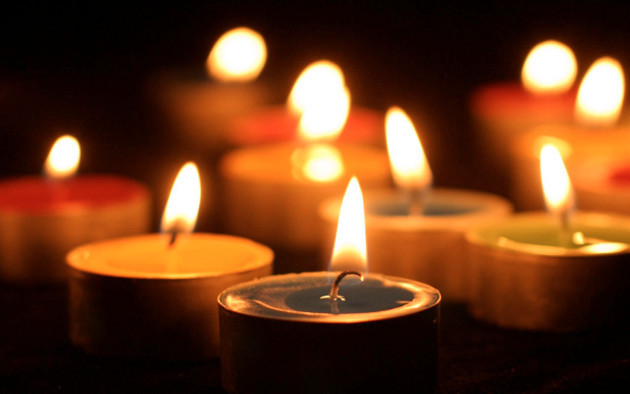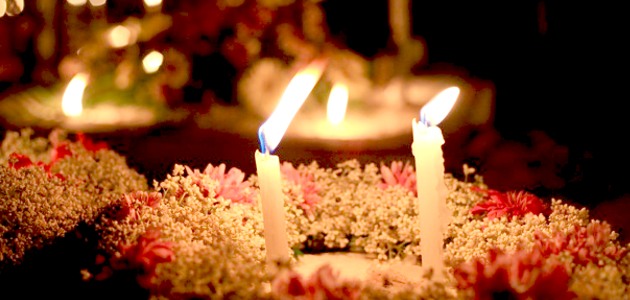The Souls in Purgatory
 The month of November is dedicated to the Souls in Purgatory, whose feast is celebrated on November 2.
The month of November is dedicated to the Souls in Purgatory, whose feast is celebrated on November 2.
Today is the feast of All-Souls, when we commemorate all those who have gone before us for their eternal reward, those who have died, marked with the sign of faith. We already commemorate the dead at every single Mass, as part of the Eucharistic Prayer, and we will hear these words again today. We recognize that they are part of the mystical body in the church. But today we reflect in a special way, not so much on the dead, but those waiting for their reward at this moment. The topic may sound morbid, but in fact it contains a secret to tremendous joy. Unless Jesus happens to return in glory first, we will all have to face death, whether our own or that of some close to us. And our faith has a direct impact on how we face this ultimate moment.
The celebration of All Souls Day is based on the theological basis that some of those who have departed from this world, have not been perfectly cleansed from venial sin, or have not fully atoned for their past transgression. As such, being temporary deprived of the beatified vision until such time as they have been completely sanctified in Christ; these departed souls are to remain in Purgatory. To assist them so that they may be freed from Purgatory, we, their spiritual brothers and sisters can help the Faithful Departed who are also members of the Body of Christ, through our prayers, our pious deeds and most important of all, through the sacrifice of the Holy Mass. The Scripture readings for today give rich matter for reflection and touch on the reality of death in general, something we will all have to face some day and for which we should be ready. After all, the Lord will come quietly, like a thief in the night. In Jesus we have the hope of resurrection that we will be united with him. Today the Church asks us to remember the faithful departed. In obedience, we do so, praying that when we have departed from this world, and most important of all, have Holy Masses celebrated on our behalf so we may quickly be assured the eternal beatified vision of God.
The Catholic teaching on Purgatory essentially seen in our belief in two realities: First, that there will be a purification of believers prior to entering heaven and Second that the prayers and masses of the faithful are sure to benefit those in the state of purification. As to the duration, place and exact nature of this purification, the Church has no official dogma, although Saint Augustine and others used fire as a way to explain the nature of the purification. We believe that the prayers and Masses of the faithful do have an impact on the purification that the faithful are undergoing in Purgatory.
On this day we remember and pray for all our dear departed members. Death is painful and can awaken feelings that are powerful, changing and compelling. The experience of death hurts us as it invites the person to imagine the afterlife, the longing to be with the divine and to enter into a new experience. On this day we are faced with the mystery of death and we are reminded of the promise of resurrection and eternal life. Today’s liturgy emphasizes the paschal character of Christian death and places in relief the resurrection of Christ as the hope of our own resurrection and new life. St Paul assures us, as he instructs the Thessalonian converts that we believe Jesus died and rose again and likewise our dear ones also will rise. We believe that God will bring with Jesus all people to himself, persons who have died believing in him. When a person dies and the body is buried it is mortal. But when raised from the dead it will be immortal, a spiritual body. Our respect for the dead specifies our respect for all human life which comes from God. The feast of All Souls is a reminder that they are members of the Communion of Saints, have been saved and will one day be in heaven. However, they need to be perfected before they can go to heaven that is cleansed of all blemishes, they come into full unity with the perfection that is God.
The Scripture readings of today provide rich matter for reflection and touch on the reality of death in general, something we will all have to face one day and for which we ought to be ready. The Scriptures tell us that the Lord will come quietly at an unexpected moment “like a thief in the night”. We do not want to have the door closed in our face and hear those terrible words: “I do not know you.” The Scripture constantly warns us to be ready to meet our Lord at any time. The readings of today also acknowledge the complexities of life. Sometimes, when we experience the loss, we feel the absence of peace. Then we are confused and overwhelmed. We await God’s mercy and his compassionate love. The gospel of John tells us of the glorification of Jesus and that when he is raised up he will draw all people to himself. The word draw is a special word that involves a sense of attraction and it is Jesus who will take us all to himself. In the Gospel of Mark we have the confession of Peter who professes that Jesus is the Son of God and Jesus in response tells the disciples that he will suffer and die and will be raised from the dead. The First Letter to the Corinthians renews that confidence. Our resurrection is as certain as that of Christ himself. If Christ is not raised, then “our faith has been in vain” and then what happened on Calvary was the end of everything. Without resurrection Jesus would have moved into nothingness and, for all of us, life would have had no meaning.
On this day the Church is asking of us to pray in a very special way for all the deceased, for all those whom we knew, but also for all those who have died without their going away ever being communicated to us. We know only a minute part of this multitude of people who died since the creation of the world, but God on the other hand, knows them all and each person in their individuality. God knows all things: he knows what we are doing now because he watches us, he listens to us. He waits for us to turn to him with the simplicity of a child who confides in his Father full of love and tenderness. Today Jesus repeats the same words for us: “All that the Father gives me will come to me; and him who comes to me I will not cast out.” So, when the Father gives to his Son all people who are called to go towards Christ, it is first and foremost this other fact which is accomplished: the Gift of the Holy Spirit. What Jesus says is that the Father gives his Son completely the Holy Spirit and every person therefore who is called by God goes toward the Saviour of the world for the eternal reward.
Today, when we are commemorating all the faithful departed we turn towards Heaven and towards the eternity. We go to the God of Love, the all holy, all powerful and to him we direct our prayers for the souls of all those who died, our brothers and sisters waiting to be one in Jesus. We must remember that the saints are not people who are free from human imperfections. Rather they are those who are outstandingly good in spite of and through their shortcomings. Every saint is also a sinner and it is a sign of sainthood that one is always aware of that. Let us ask Mary, who saw her Son on earth, and who sees him constantly in Heaven, to grant us this grace of eternal life. We pray to Mary our Mother that through her intercession all Christians receive the eternal life which is in her Son, and may the souls of all the departed rest in eternal peace through her intercession.
(Source: Homilies of Fr. Eugene Lobo S.J.)


